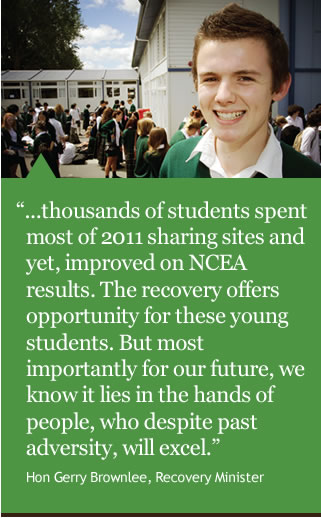School-age learning
Greater Christchurch has more than 200 state and integrated schools, including nine special schools and two teen parent units. On 22 February 2010, just over 74,265 pupils were enrolled in these schools – approximately 12% of these students are Māori and 4% are Pasifika.
The range of schools includes single-sex secondary schools, integrated schools, a relatively small number of Māori immersion and bilingual options, and the designated character schools – Unlimited and Discovery 1. There are also 11 independent (private) schools.
While the existing network has many strengths, it has not delivered well for all students.
Looking to the future of schooling
The education renewal process provides an opportunity to address inequity of learning, as well as the problems caused by the earthquakes.
We plan to do this by building on the best of existing practice while supporting the development of new, more effective approaches to teaching and learning.
This means making schools more learner-centred and better able to respond to the widely varied aspirations and needs of children and young people.
The potential for students to explore contexts of interest and pursue learning pathways of their own choosing has never been greater, nor has the opportunity for schools to partner with other schools and tertiary providers to help meet learners needs.
Catering for special education needs is also an area where improvements can be made. Currently we have three special schools in Christchurch City in locations that are at odds with demographics and community needs.
As we plan a a renewed schooling system there is a unique opportunity to think about new ways of delivering education to provide better opportunities for learners and support higher rates of achievement.
The following actions will help address the challenges for school-age learning in greater Christchurch:
- Planning educational provision as a network of community-situated campuses/facilities.
- Introducing modern, flexible and inclusive learning environments.
- Implementing a digital strategy for learning.
- Developing better approaches to managing transitions and career guidance.
- Ensuring identities, languages and cultures of learners continue to be valued and supported.
- Improving outcomes for learners with special needs.
- Supporting quality teaching and leadership that enables successful learning.
You can learn more about the actions to support school-age learning [PDF; 881kb] in the Education Renewal Recovery Programme which has informed the development of a plan for renewal that will improve the delivery of education, extend the options available for learners, and lift student achievement.
We have also provided some resource material, including maps and background information, that should help you better understand the situation we find ourselves in.
The Education Renewal Recovery Programme also outlines actions around the future of early childhood education, tertiary and international education.
